Poetry
Poetry

Gedichten en gedachten in het Frans
Written in La Ferme Arpoix (Ceaux-en-Loudun) and Paris, 1998. Dedicated to Guy.
Staple bound, ltd. to 200 copies. Riso-printed on Munken Pure Rough 120gsm by Risiko Press in Borgerhout, covers silkscreened on Eskaboard by Maarten de With, copy editing by Sis Matthé, design by Kaye & Matthé, typeface: Elementa.
[The title of this book is in Dutch, the text is in French]
"Met dank aan Eliane Van De Velde en Marie-Sophie Beinke."
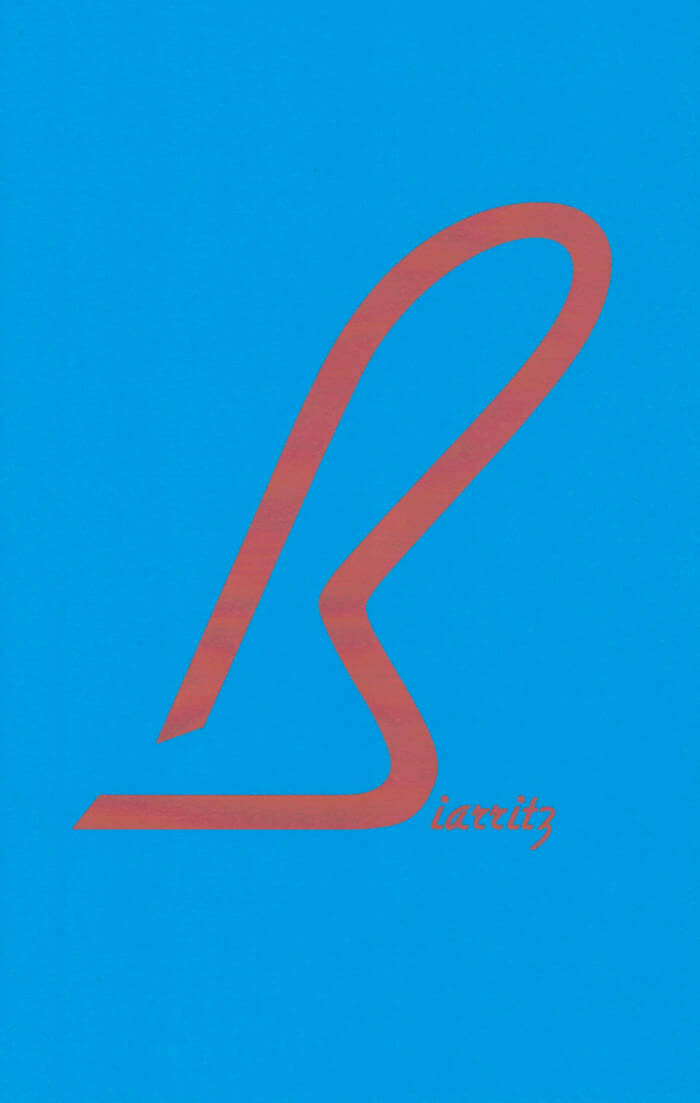
Biarritz
Written and edited in Biarritz, Borgerhout and Midsommarkransen, 2016—2021. Dedicated to Räffi, with much love. Another version of this text was published in Pfeil Magazin 10 (Montez Press, 2018); editor: Anja Dietmann, copy-editor: Stacy Skulnik. Epigraph from Numéro Deux (1975) by Anne-Marie Miéville and Jean-Luc Godard. Presented on Saturday February 5th 2022 at Kransen, Borgerhout.
128x201mm, 40p, staple bound. Riso-printed on Arcoprint Edizioni Avorio 90g and Clairefontaine Blue 210g. Design by Kaye–Matthé, typefaces: Tribute, Gillies Gothic Light. Printed by Risiko Press at Kransen, covers silkscreened at Afreux, bound by Drukkerijcollectief De Wrikker. Edition of around 200.
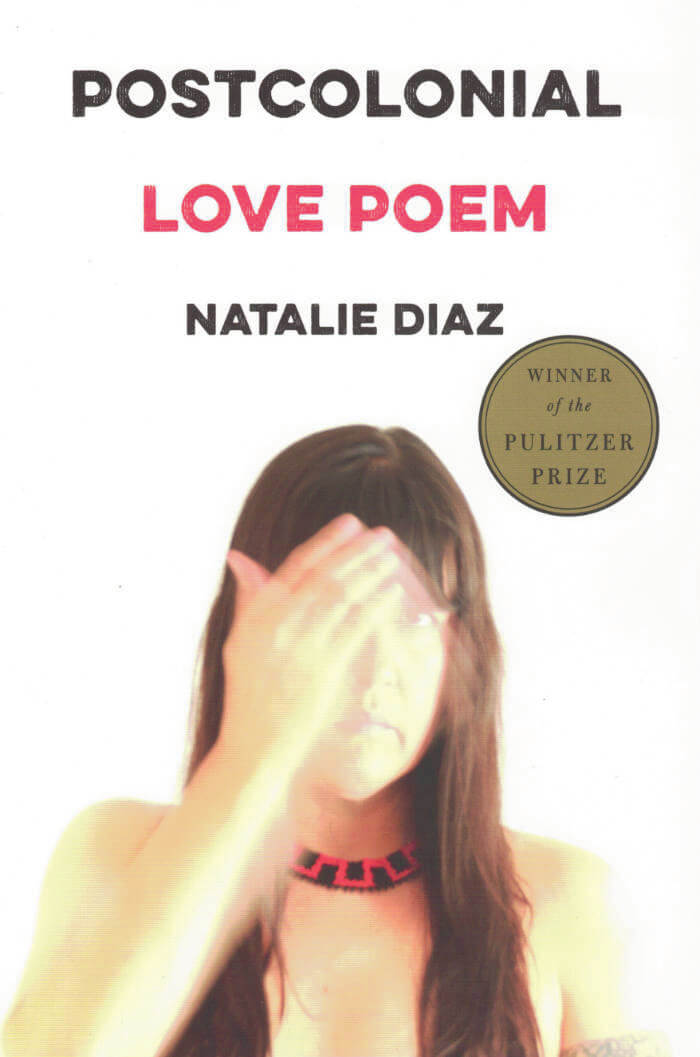
Postcolonial Love Poem
Postcolonial Love Poem is an anthem of desire against erasure. Natalie Diaz's brilliant second collection demands that every body carried in its pages—bodies of language, land, rivers, suffering brothers, enemies, and lovers—be touched and held as beloveds. Through these poems, the wounds inflicted by America onto an indigenous people are allowed to bloom pleasure and tenderness: "Let me call my anxiety, desire, then. / Let me call it, a garden." In this new lyrical landscape, the bodies of indigenous, Latinx, black, and brown women are simultaneously the body politic and the body ecstatic. In claiming this autonomy of desire, language is pushed to its dark edges, the astonishing dunefields and forests where pleasure and love are both grief and joy, violence and sensuality.
Diaz defies the conditions from which she writes, a nation whose creation predicated the diminishment and ultimate erasure of bodies like hers and the people she loves: "I am doing my best to not become a museum / of myself. I am doing my best to breathe in and out. // I am begging: Let me be lonely but not invisible." Postcolonial Love Poem unravels notions of American goodness and creates something more powerful than hope—in it, a future is built, future being a matrix of the choices we make now, and in these poems, Diaz chooses love.
WINNER OF THE 2021 PULITZER PRIZE IN POETRY
FINALIST FOR THE 2020 NATIONAL BOOK AWARD FOR POETRY
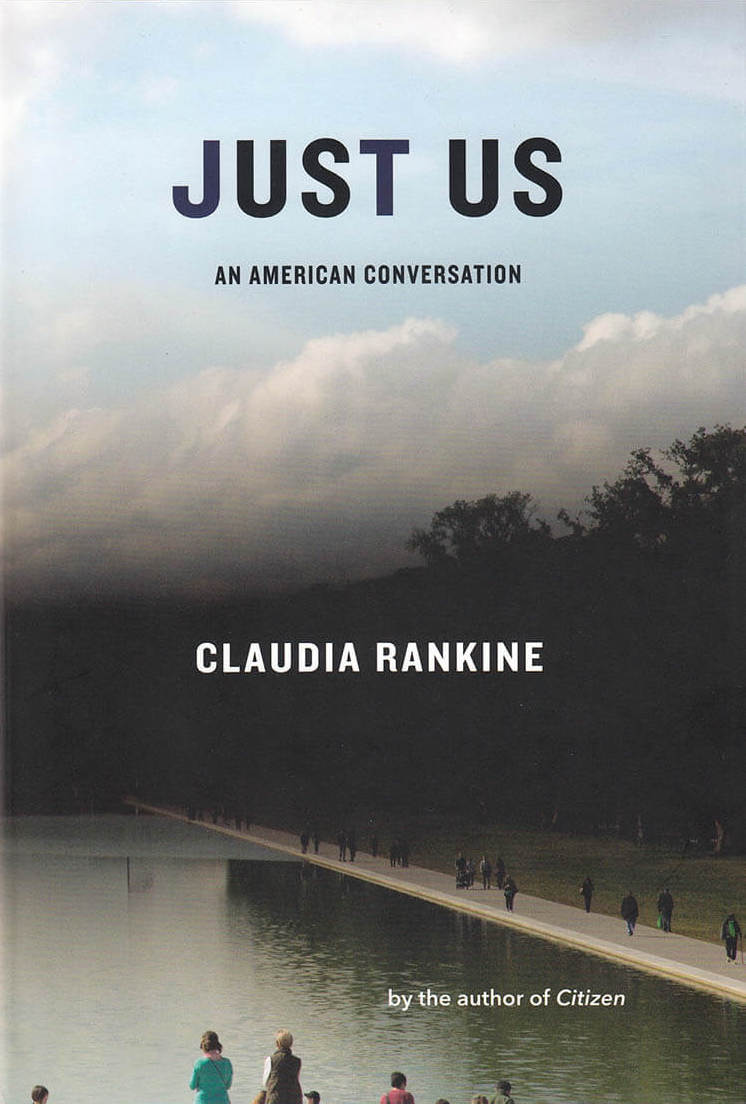
Just Us: An American Conversation
In Just Us, Claudia Rankine invites us into a necessary conversation about Whiteness in America. What would it take for us to breach the silence, guilt, and violence that arise from addressing Whiteness for what it is? What are the consequences if we keep avoiding this conversation? What might it look like if we step into it? "I learned early that being right pales next to staying in the room," she writes.
This brilliant assembly of essays, poems, documents, and images disrupts the false comfort of our culture's liminal and private spaces—the airport, the theater, the dinner party, the voting booth—where neutrality and politeness deflect true engagement in our shared problems. Rankine makes unprecedented art out of the actual voices and rebuttals of others: White men responding to, and with, their White male privilege; a friend clarifying her unexpected behavior at a play; and women on the street expressing the political currency of dyeing their hair blond, all running alongside fact-checked notes and commentary that complement Rankine's own text, complicating notions of authority and who gets the last word. Funny, vulnerable, and prescient, Just Us is Rankine's most intimate and urgent book, a crucial call to challenge our vexed reality.
Claudia Rankine is a poet, an essayist, and a playwright. Just Us completes her groundbreaking trilogy, following Don't Let Me Be Lonely and Citizen. She is a MacArthur Fellow and teaches at New York University.
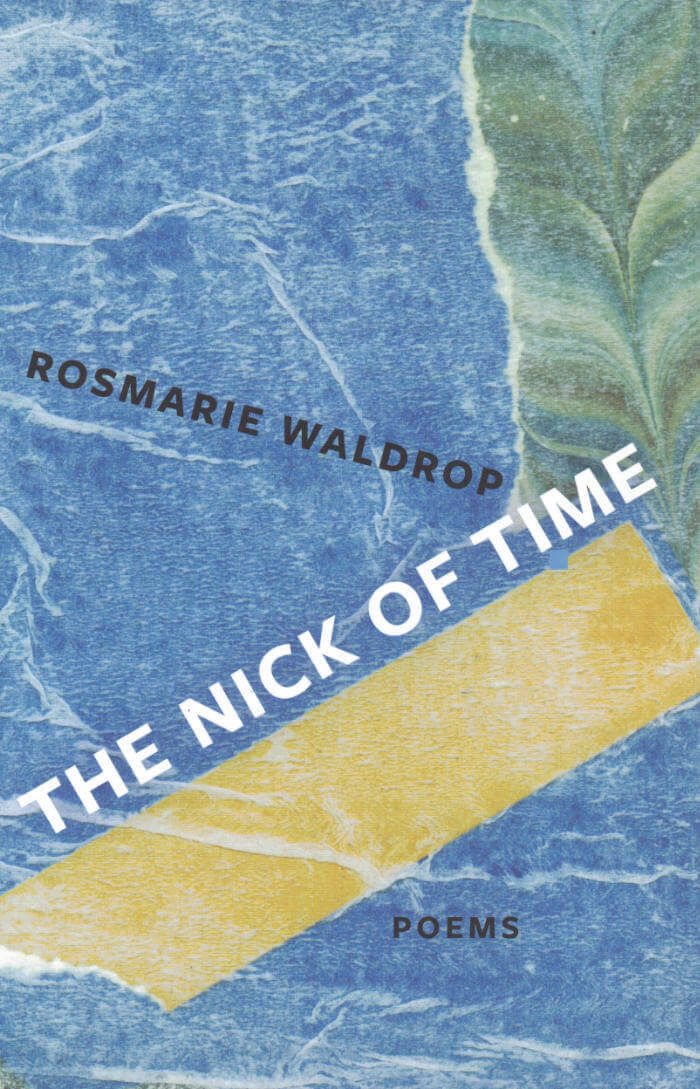
The Nick of Time
A philosophical tour de force melding astrophysics and grief by the American maestra of the prose poem.
"If memory serves, it was five years ago that yours began to refuse," Rosmarie Waldrop writes to her husband in The Nick of Time. "Does it feel like crossing from an open field into the woods, the sunlight suddenly switched off? Or like a roof without edge or frame, pushed sideways in time?" Ten years in the making, Waldrop's phenomenally beautiful new collection explores the felt nature of existence as well as gravity and velocity, the second hemisphere of time, mortality and aging, language and immigration, a Chinese primer, the artist Hannah Höch, and dwarf stars. Of one sequence, "White Is a Color," first published as a chapbook, the Irish poet Billy Mills wrote, "In what must be less than 1000 words, Waldrop says more about the human condition and how we explore it through words than most of us would manage in a thousand pages." Love blooms in the cut, in the gap, in the nick between memory and thought, sentence and experience. Like the late work of Cézanne, Waldrop's art has found a new way of seeing and thinking that "vibrates on multiple registers through endless, restless exploration" (citation for the Los Angeles Times Book Prize).
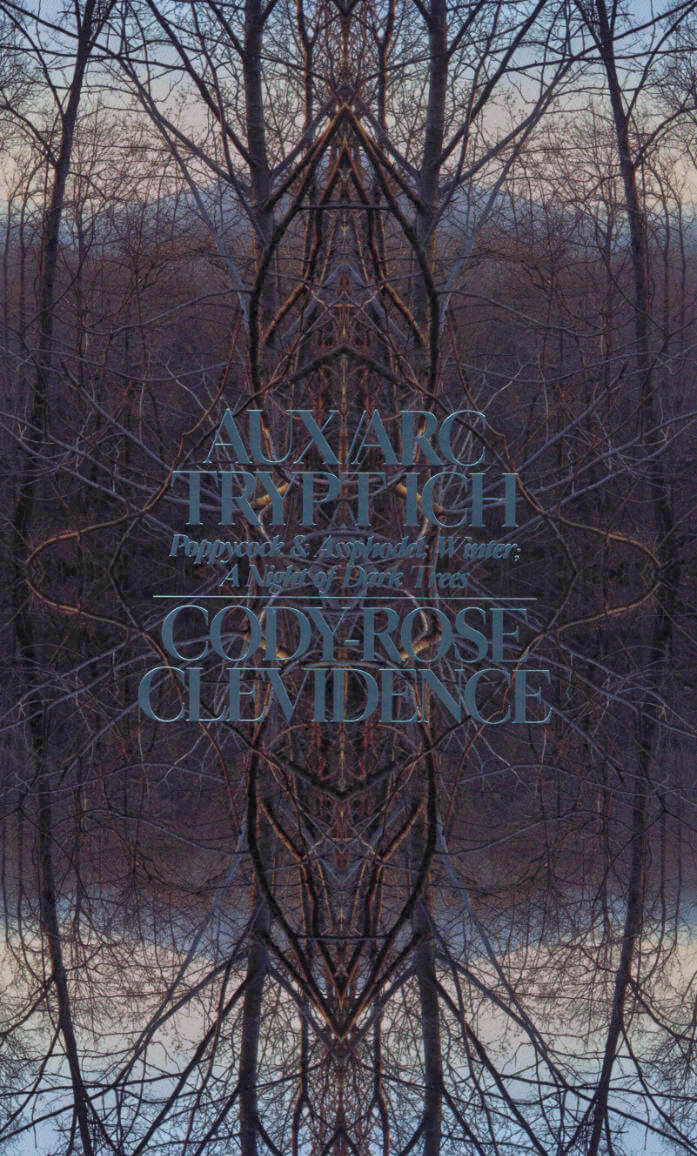
Aux ARC Trypt Ich: Poppycock and Assphodel; Winter; A Night of Dark Trees
A triptych of wild, lyric love poems that are, at heart, an ode to Arkansas.
Set among blue Ozark creeks, hoods of trucks, and changing constellations, Cody-Rose Clevidence's poems call up embodied sensations as they arise, with love and anguish, in a specific place. Navigating between senses and the sensed world, in lyric, lushness and density, Clevidence constructs an intricate and playful poetics both experimental and emotive to investigate the interplay between the vivid sensations of the body and the viscerally surrounding world.
Cody-Rose Clevidence is the author of BEAST FEAST and Flung/Throne (Ahsahta) as well as Listen My Friend, This is the Dream I Dreamed Last Night (2021, Song Cave) and Aux Arc / Trypt Ich, (2021, Nightboat) and several handsome chapbooks. They live in the Arkansas Ozarks with their assorted animals named after other animals.
Published Nov, 2021.
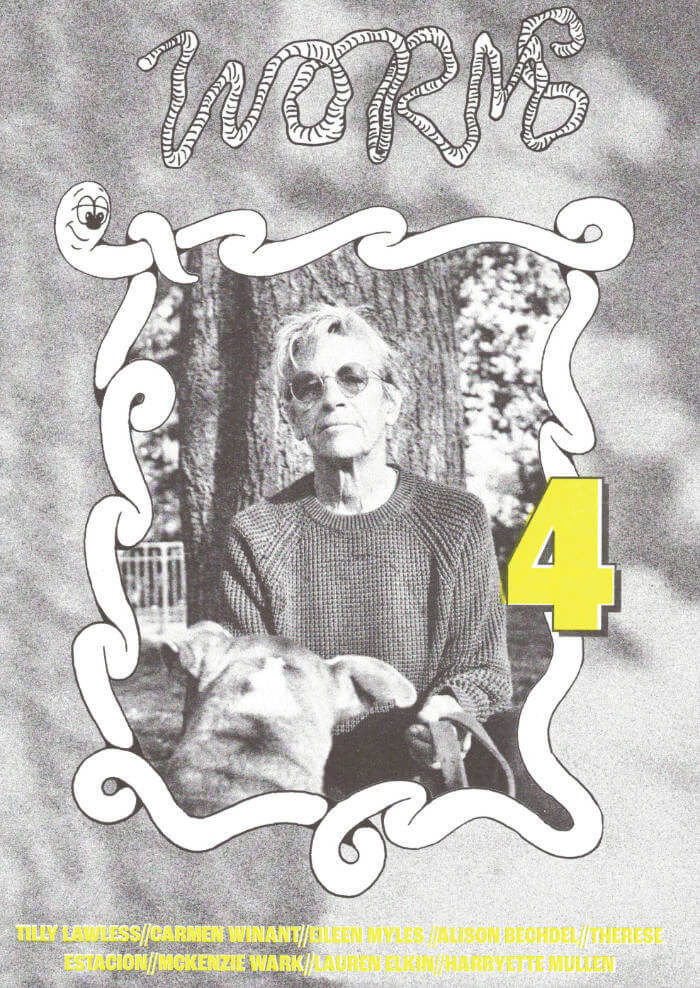
Worms #4 'The Flaneuse'
Worms #4 looks at psychogeography and the Situationists from a non-male perspective. Taking flâneuserie and the creative benefits of a good walk as its starting point, the issue features conversations with Eileen Myles, Alison Bechdel, Lauren Elkin, Tilly Lawless, Mckenzie Wark, Therese Estacion and Carmen Winant. 2021 was a fraught year for walking; the pandemic restricted our right to movement, while the murders of women walking in London led us to ask the question: how can the act of walking the streets spark political conversation?
Also included with this issue is an affirmation booklet in collaboration with @somuchluvindisclub
Worms is a biannual literary style magazine that celebrates female and non-binary writer culture.
‘If you’re reading this, you are a worm. We’re all worms, and in the end, we’re going to be eaten by them. As a (book)worm, you will fertilize your mind with glorious words…’
Founded in 2019 by Clem Macleod during her degree at Central Saint Martins, Worms began with a mad, spiralling obsession with the late Kathy Acker.
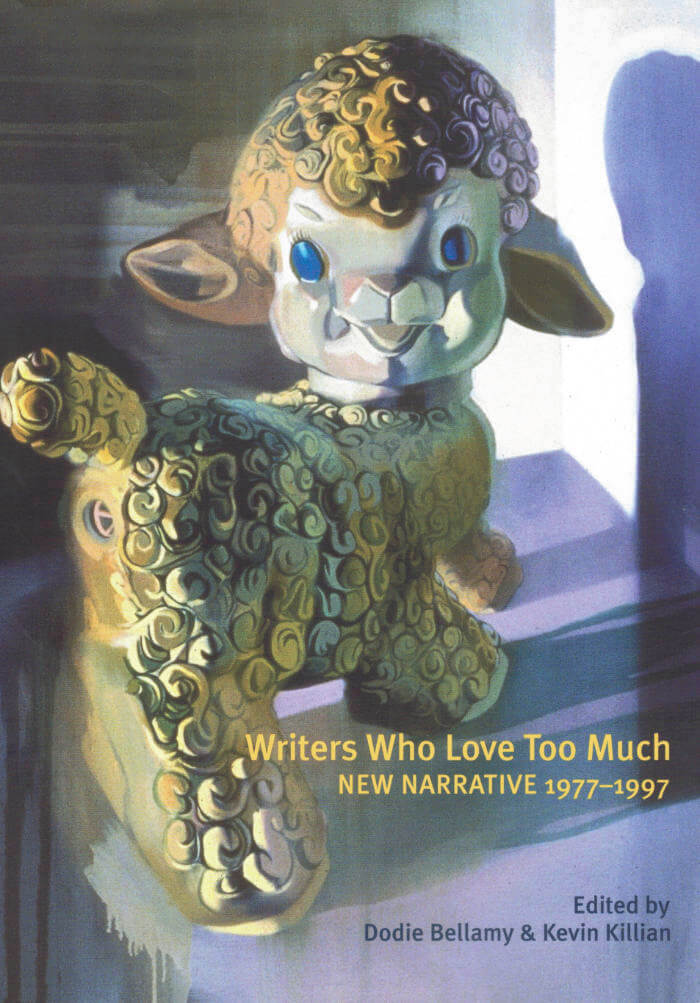
Writers Who Love Too Much: New Narrative 1977-1997
This long overdue anthology of New Narrative includes both classic New Narrative texts and rare supplementary materials, allowing the movement fueled by punk, pop, porn, French theory, and social struggle to bound back to life, ripe with dramatic propulsion, to form a new map of late 20th century creative rebellion.
"Gossipy and uninhibited, its breath is hot in your ear. It wants to tell you everything, and it wants you to overshare back." — M. Milks
"One of New Narrative's all-time best jokes is about the movement itself. It's the parodic motto that Bellamy formulates in Academonia for New Narrative "at its worst" "I have sex and I'm smarter than you." But "sex without fantasy," Camille Roy posits, "is nothing." The pieces compiled in Writers Who Love Too Much don't restrict fantasy. They use, as Boone says, eros, rather than facts, as the matter of narrative. Sex and fantasy are for New Narrative the stuff of ordinary life." — Jean-Thomas Trembla
Contributors include: Steve Abbott, Kathy Acker, Michael Amnasan, Roberto Bedoya, Dodie Bellamy, Bruce Benderson, Charles Bernstein, Nayland Blake, Bruce Boone, Lawrence Braithwaite, Rebecca Brown, Kathe Burkhart, Marsha Campbell, Dennis Cooper, Sam D'Allesandro, Gabrielle Daniels, Leslie Dick, Cecilia Dougherty, Bob Flanagan, Robert Glück, Judy Grahn, Brad Gooch, Carla Harryman, Richard Hawkins, Ishmael Houston-Jones, Gary Indiana, Edith A. Jenkins, Kevin Killian, Chris Kraus, R. Zamora Linmark, Eileen Myles, John Norton, F.S. Rosa, Camille Roy, Sarah Schulman, Gail Scott, David O. Steinberg, Lynne Tillman, Matias Viegener, Scott Watson, Laurie Weeks.

Pieces of a Song: selected poems
Feminist Beat poet Diane di Prima was born in Brooklyn, New York. She attended Swarthmore College for two years before moving to Greenwich Village in Manhattan and becoming a writer in the emerging Beat movement. There, she developed friendships with poets Amiri Baraka, Allen Ginsberg, Jack Kerouac, Frank O'Hara and Audre Lorde. After joining Timothy Leary's intentional community in upstate New York, she moved to San Francisco in 1968. One of her collections of poetry, The Poetry Deal, is also published by City Lights Publishers. Di Prima was named Poet Laureate of San Francisco in 2009. She has been awarded the National Poetry Association's Lifetime Service Award and the Fred Cody Award for Lifetime Achievement and has also received grants from the National Endowment for the Arts, the Committee on Poetry, the Lapis Foundation and the Institute for Aesthetic Development. St. Lawrence University granted her an honorary doctorate.

The Spring Flowers Own & The Manifestations of the Voyage
“The Spring Flowers Own” and “The Manifestations of the Voyage” continue and complete the Cycle of the Linden Tree, which started with two poems previously published in The Indian Never Had a Horse & Other Poems: “One Linden Tree, Then Another Linden Tree,” and “An Alley of Linden Trees, and Lightning.”
Etel Adnan was born in Beirut, Lebanon in 1925, the daughter of a Greek Christian from Smyrna and a high-ranking Ottoman officer from Damascus. She passed away in November 2021. Her work as a whole is a faithful record of the times and places she has lived in Beirut, Paris, and in the San Francisco Bay Area. At least eighteen works by Adnan have been published in English. They include SITT MARIE ROSE (Post-Apollo Press, 1982); THE ARAB APOCALYPSE (Post-Apollo Press, 1989); SEA AND FOG (Nightboat Books, 2012), winner of the Lambda Literary Award for Lesbian Poetry and the California Book Award for Poetry; and PREMONITION (Kelsey Street Press, 2014). Nightboat Books published the 2-volume set, TO LOOK AT THE SEA IS TO BECOME WHAT ONE IS: AN ETEL ADNAN READER, in 2014. In 2011, Adnan received Small Press Traffic's Lifetime Achievement Award. Her paintings, described by New York Times art critic Roberta Smith as stubbornly radiant abstractions, have been widely exhibited, most recently at Documenta 13 and in the 2014 Whitney Biennial. Spanning media and genres, Adnan's writings have led to numerous collaborations with artists and musicians, including the French part of CIVIL WarS, a multi-language opera by American stage director Robert Wilson, performed in Lyon and Bobigny in 1985.

I Love Nature
De eerste tekstuitgave van theater- en filmmaker, schrijver, wildplukker en ecoseksueel/klimaatactivist Nora Ramakers, die in haar werk de erotische essentie van de natuur poogt bloot te leggen.
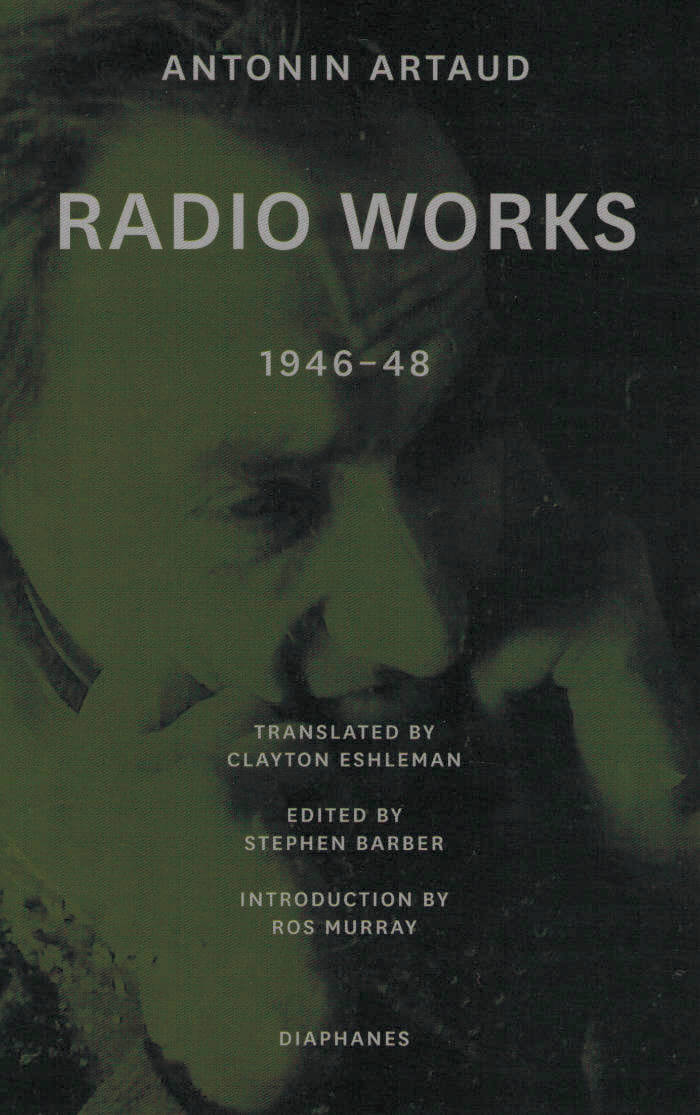
Radio Works – 1946-48
The translated transcripts of two radio broadcasts by Artaud: To have done with the judgement of god (1947-48) and Madness and Black Magic (1946). Correspondences from that period are also included.
In the last two years of his life, following his release from the Rodez asylum, Antonin Artaud decided he wanted his new work to connect with a vast public audience, and chose to record radio broadcasts in order to carry through that aim. That determination led him to his most experimental and incendiary project, To have done with the judgement of god, 1947-48, in which he attempted to create a new language of texts, screams, and cacophonies: a language designed to be heard by millions, aimed, as Artaud said, for “road-menders”. In the broadcast, he interrogated corporeality and introduced the idea of the “body without organs”, crucial to the later work of Deleuze and Guattari. The broadcast, commissioned by the French national radio station, was banned shortly before its planned transmission, to Artaud's fury.
This volume collects all of the texts for To have done with the judgement of god, together with several of the letters Artaud wrote to friends and enemies in the short period between his work's censorship and his death. Also included is the text of an earlier broadcast from 1946, Madness and Black Magic, written as a manifesto prefiguring his subsequent broadcast. Clayton Eshleman's extraordinary translations of the broadcasts activate these works in their extreme provocation.
Antonin Artaud (1896-1948) was a French dramatist, poet, essayist, actor, and theater director, widely recognized as one of the major figures of twentieth-century theater and the European literary avant-garde.

David Robilliard Notebooks 1983-1988
This book follows the first exhibition of Robilliard’s notebooks, ‘Disorganised Writings and Sketches’ with Rob Tufnell in Cologne in April 2019. It was made with support from the Elephant Trust and the book’s designers, A Practice for Everyday Life and with assistance from James Birch, one of David’s gallerists, and Chris Hall, custodian of the estate of Andrew Heard. The book is dedicated to Andrew Heard.
Rob Tufnell presents a new publication of extracts from the notebooks of the poet and artist David Robilliard (b.1952 – d.1988). After his premature death from an AIDS-related illness in 1988, Robilliard left a large number of notebooks in the care of his close friend and fellow artist Andrew Heard. These were obsessively filled with drafts of poems, diary entries, addresses and telephone numbers, blunt observations, quiet reflections, short stories, ideas for paintings, portraits and crude drawings. Robilliard’s superficially simple, pithy prose and verse is riddled with the dichotomies of an era that was both exuberant and miserable. His notebooks reveal his creative process, his interests, ideas, ambitions and then his illness but always embody his often repeated belief that ‘Life’s not good it’s excellent.’
Many of the books contain the inscription: ‘If found please return to 12 Fournier Street, London E1. Thank you’ – the home and studio of his patrons, Gilbert & George. In their lament ‘Our David’ (1990) they describe their protégé as:
“...the sweetest, kindest, most infuriating, artistic, foul-mouthed, witty, sexy, charming, handsome, thoughtful, unhappy, loving and friendly person we ever met... Starting with pockets filled with disorganised writings and sketches, he went on to produce highly original poetry, drawings and paintings.”
The publication exists in two editions: yellow and pink.
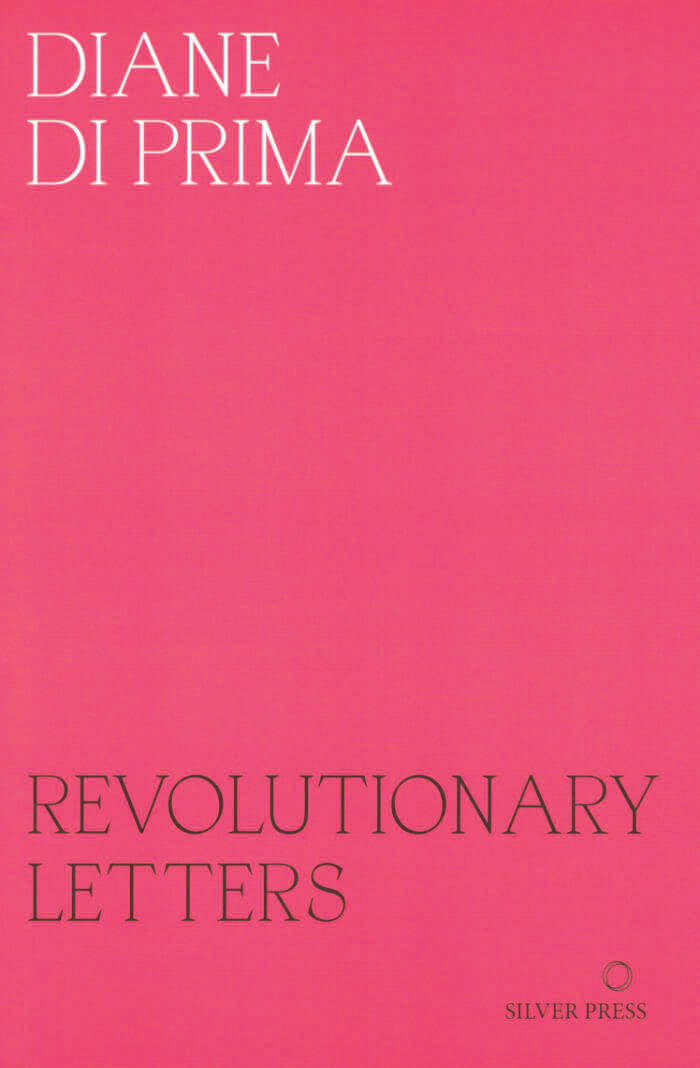
Revolutionary Letters
Diane di Prima began writing her ‘Letters’ in 1968, conjuring a potent blend of utopian visions, ecological urgency and spiritual insight. By turns a manifesto for breaking free, a manual for street protest and a feminist broadside, these poems are as relevant to the convulsions and crises of today as they were fifty years ago.
During the last years of her life, di Prima worked on the final iteration of her enduring project. This volume brings together fifteen new poems with all the previously published Letters in an expanded fiftieth anniversary edition.
With a Foreword by Francesca Wade and an Introduction by Sophie Lewis
Publication: 20 October 2021
ISBN: 978-0-9957162-6-1
Extent: 232 pages
'Di Prima is one of the greatest writers of her generation.' - Chris Kraus
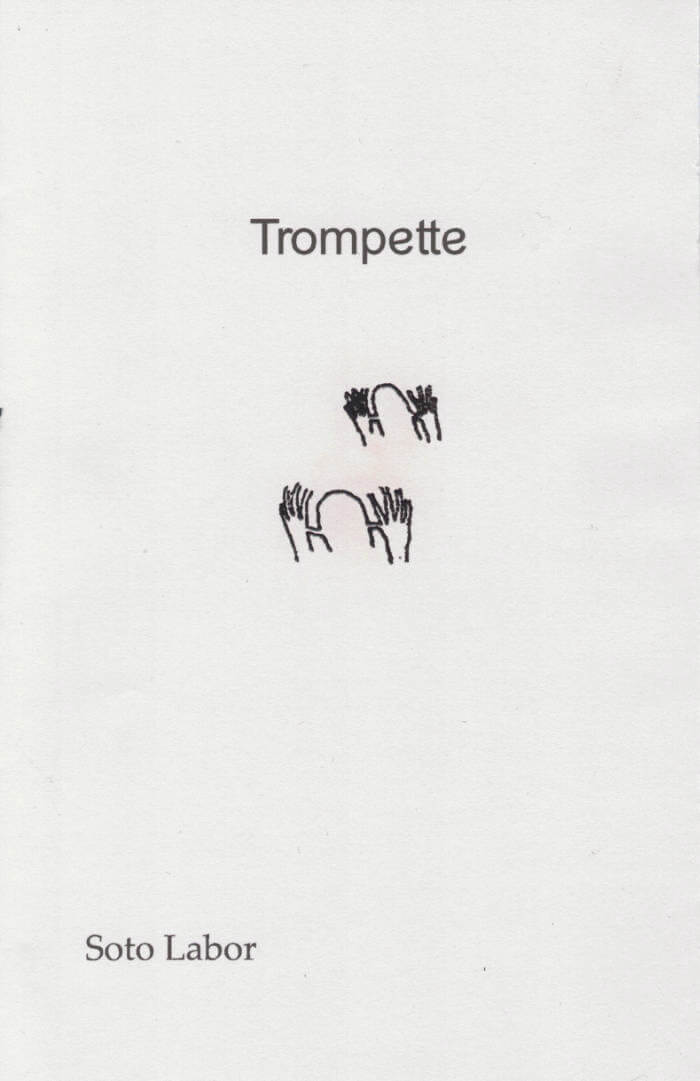
Trompette
Yesterday as they smoked, a cigarette butt leaked and burned
their delicately stitched summertime pyjamas. A round hole
on their torso reminded the holes drilled in the wall the day
before to ventilate their room.
Trompette gathers three short texts by Soto Labor, along with their beautiful drawings, that tell about magnificient animals who observe and eat the world.
Bilingual, French & English.
Trois courts textes de Soto Labor, accompagnés de ses dessins, où des animaux magnifiques observent et mangent le monde.
Bilingue français/anglais.
The Presage Pamphlet Series welcomes new, shorter and more portable text formats, printed in-house (it’s cheap & chic!).
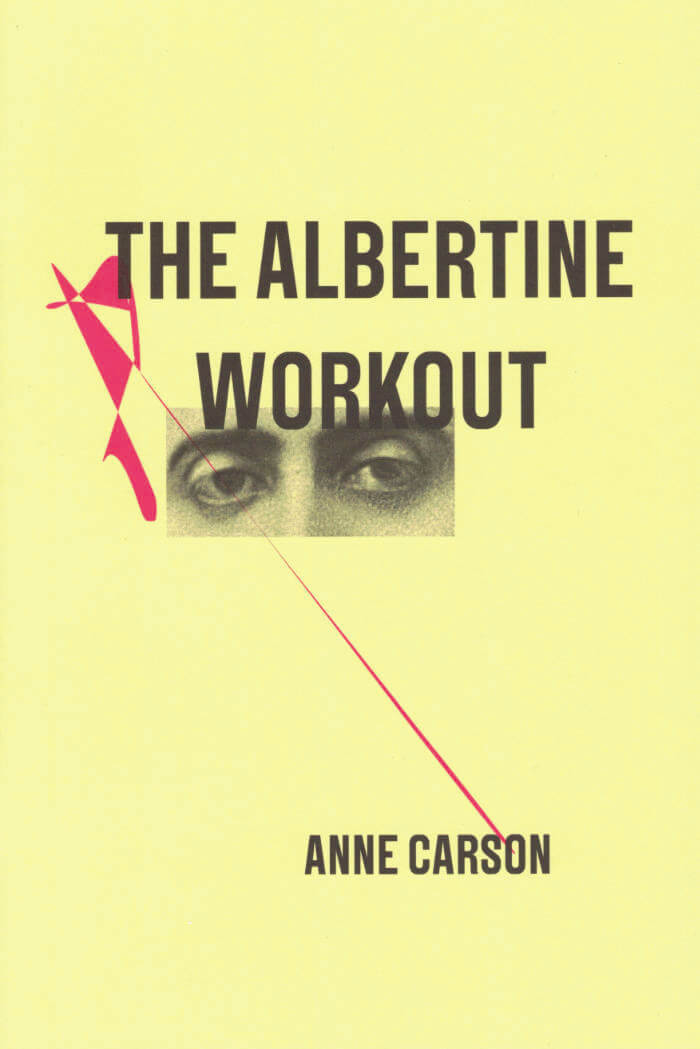
The Albertine Workout
The Albertine Workout contains fifty-nine paragraphs, with appendices, summarizing Anne Carson's research on Albertine, the principal love interest of Marcel in Proust's Á la recherche du temps perdu.

Evolution
"In Eileen Myles's newest book of poetry, Evolution, we encounter an arrival, a voice always becoming, unpinnable and queer. Myles's new poems are transformations, and perhaps a culmination of the poet's previous inquiries into love, gender, poetry, America, and its politics . . . The form of Myles's work rivals its subject matter in intimacy. The lines in Evolution are physical, a body unleashed but not yet comfortable and not without fear. The short lines rush down the page, movement as touch, touch as freedom." — Natalie Diaz, New York Times Book Review

Un rectangle quelconque n°6
Tomas Sidoli, Emmanuel Régniez and 1 more
Avec les poèmes et traductions de: Pierre Escot, Marine Forestier, Adrien Lafille, Alexis Aurdren, Maud Joiret.
Édition: Thomas Le Goff, Emmanuel Régniez, Tomas Sidoli.
Les éditions du quelconque se divisent en deux projets, une maison d'édition (à venir) et une revue, Un Rectangle Quelconque. Cette dernière, chaque semestre, propose de découvrir des auteurs de poésie venant de tous horizons géographiques et esthétiques. La maison d'édition, elle, sera l'occasion de présenter aux lecteurs francophones des nouvelles voix de la poésie actuelle.
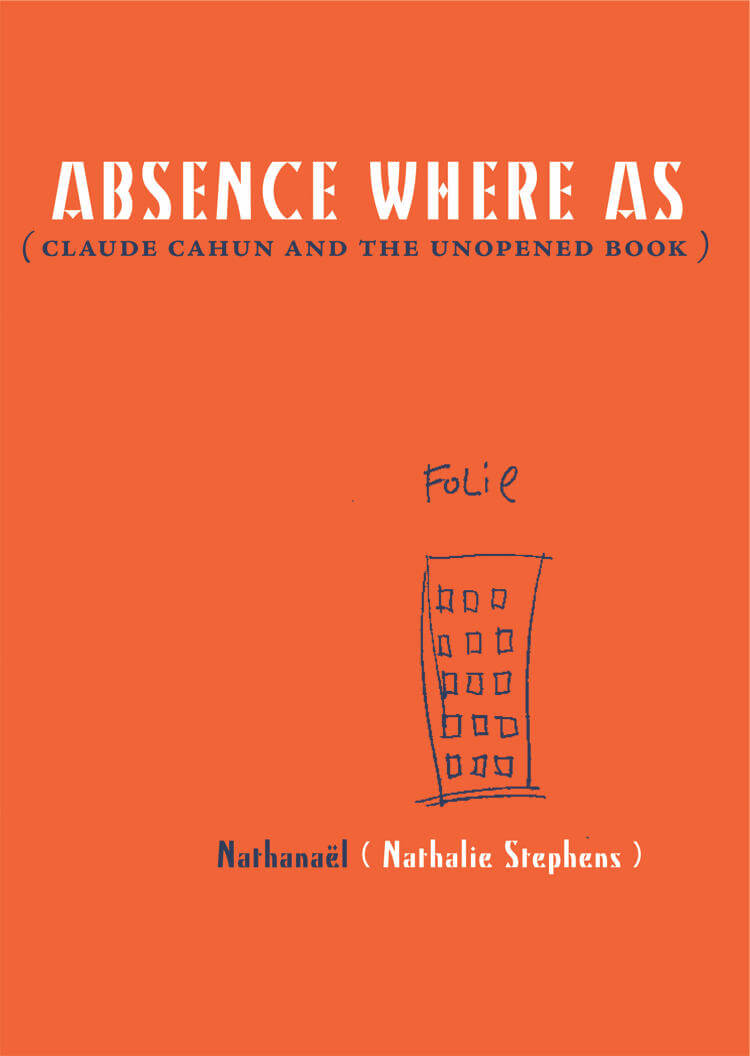
Absence Where As: Claude Cahun and the Unopened Book
This book, from inter-genre, bilingual writer Nathanaël, investigates the relationship between image and language through a philosophical and poetic meditation on a self-portrait by Surrealist photographer and writer Claude Cahun.
"In Absence Where As, Nathanael reads the unread book, ‘the book that comes’ to us nevertheless, that haunts and hovers unopened and dreamt, proceeding from the Ecrits of the visionary and revolutionary artist-activist Claude Cahun, to life’s library. Through this constellatory essay in the faults of thought, in reading’s flaw, Nathanael comes to know and know how, creating new epistemological and aesthetic territory in the radiant continuum between lyric and narrative, the text and the dream of text, which is literature itself." - John Keene
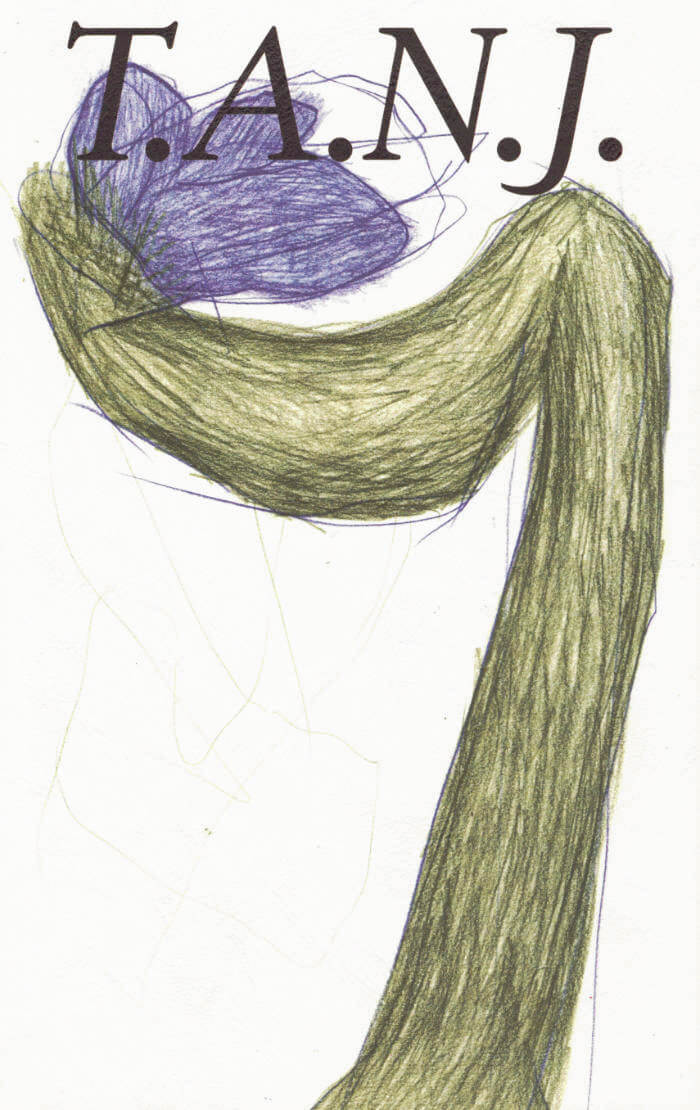
The Against Nature Journal #3
Aimar Arriola, Grégory Castéra
This third issue reviews the many ways in which medicine has pathologized non-procreative sexual desire— those bodies that challenge gender binaries or expose different abilities—while imagining other ways of collectively well-being.
"The issue opens with a commissioned work by visual artists CANDICE LIN and P. STAFF that evokes the central concerns of the journal in subtle and unexpected ways. Lambda Literary Award–winner INDRAPRAMIT DAS speculates on other forms of kinship in a new science-fiction story, while a transnational questionnaire offers insights into the continuous fight for reproductive justice.
We republish a chapter from the autobiography of the late South African, trans, traditional healer NKUNZI ZANDILE NKABINDE, which is introduced by RUTH MORGAN.
We continue to honor the power of poetry with works by ROSA CHÁVEZ and STELLA NYANZI, while celebrating the energy of collective action with a piece by WHAT WOULD AN HIV DOULA DO? In anticipation to his new book on queer desire in the Caribbean, scholar ANDIL GOSINE shares a previous article addressing the notion of “against nature,” while our Columns section brings news from Brazil, India, Kenya, Lebanon, Malaysia, Morocco, and the UK during a season of pandemic fatigue, but also care work, organization, and hope." — the editors

The Essential June Jordan
The Essential June Jordan honors the enduring legacy of a poet fiercely dedicated to building a better world. In this definitive volume, featuring an afterword by Pulitzer Prize-winner Jericho Brown, June Jordan’s generous body of poetry is distilled and curated to represent the very best of her works.
Written over the span of several decades―from Some Changes in 1971 to Last Poems in 2001―Jordan’s poems are at once of their era and tragically current, with subject matter including racist police brutality, violence against women, and the opportunity for global solidarity amongst people who are marginalized or outside of the norm. In these poems of great immediacy and radical kindness, humor and embodied candor, readers will (re)discover a voice that has inspired generations of contemporary poets to write their truths. June Jordan is a powerful voice of the time-honored movement for justice, a poet for the ages.
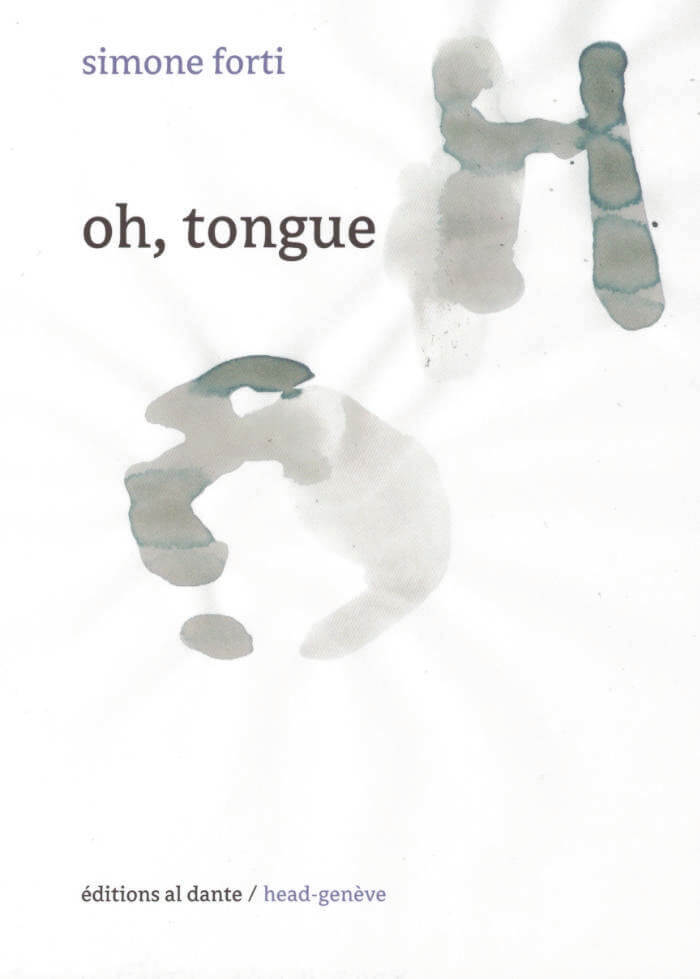
oh, tongue
The notebook of American dancer and choreographer Simone Forti, in which she shares her poetry as well as her thoughts on dance, the body, writing, the state of the world… The publication includes an interview with Forti by Annie Suquet, and an afterword by poet and Fluxus artist Jakson Mac Low.
American dancer and choreographer Simone Forti (born 1935 in Florence, Italy) has been a leading figure in the development of contemporary performance over more than fifty years. Artist, choreographer, dancer, writer, Forti has dedicated herself to the research of a kinesthetic awareness, always engaging with experimentation and improvisation. Investigating the relationship between object and body, through animal studies, news animations and land portraits, she reconfigured the concept of performance and dance.
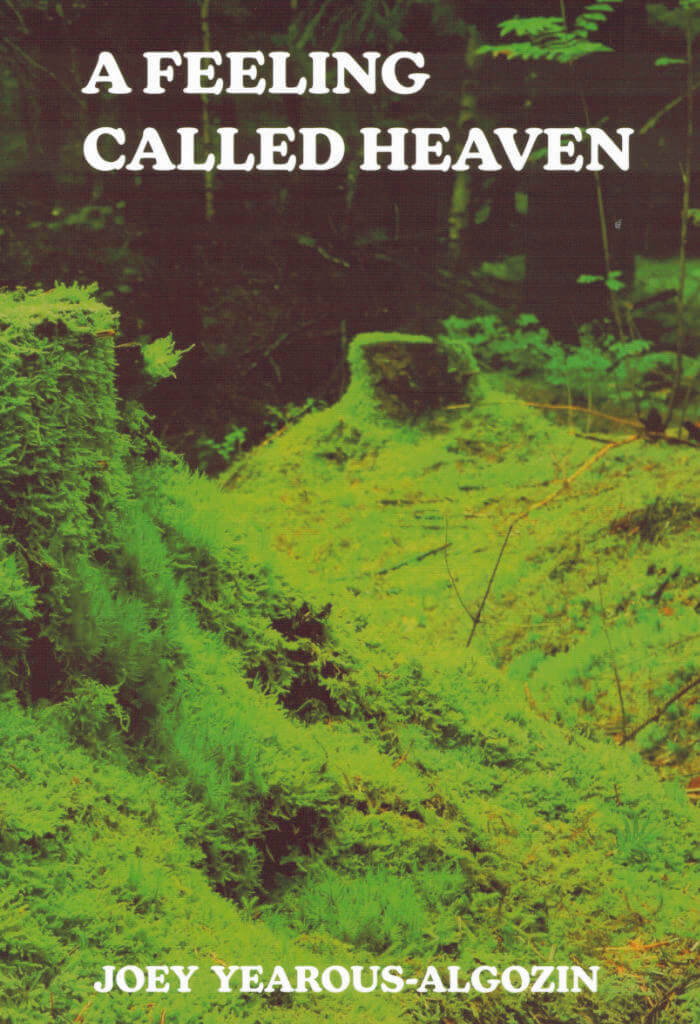
A Feeling Called Heaven
Adopting the role of a death doula or New Age religious leader, and drawing inspiration from the Theater of the Absurd, author Yearous-Algozin prompts readers to accept the already occurring end time. A Feeling Called Heaven oscillates between grief and humor as it imagines the nonhuman world that will grow from the ruins of this one, cultivating a sense of presence and intimacy with the inevitable destruction of our global environment.
Yearous-Algozin is the author of over 20 texts/files including Utopia (2016); Caller Removed (2016); Air the Trees (2012); and the multi-volume work, The Lazarus Project (2010-2013). With Holly Melgard he has co-authored a trilogy of texts: Liqudation (2017), White Trash (2014) and Holly Melgard's Friends and Family (2014). His poetry, poetics, and criticism have appeared in BOMB Magazine, Convolutions, Dreamboat, A Perfect Vacuum, and Social Text, among others. His work has been performed and/or installed at the Museum of Contemporary Art (MoCA), the Museum of Modern Art (MoMA), and The Graphische Sammlung ETH Zürich. Yearous-Algozin is a founding member of the Troll Thread publishing collective and a former co-editor of P-QUEUE (2010-2013). He earned a PhD from the State University of New York at Buffalo and now teaches at Baruch College.
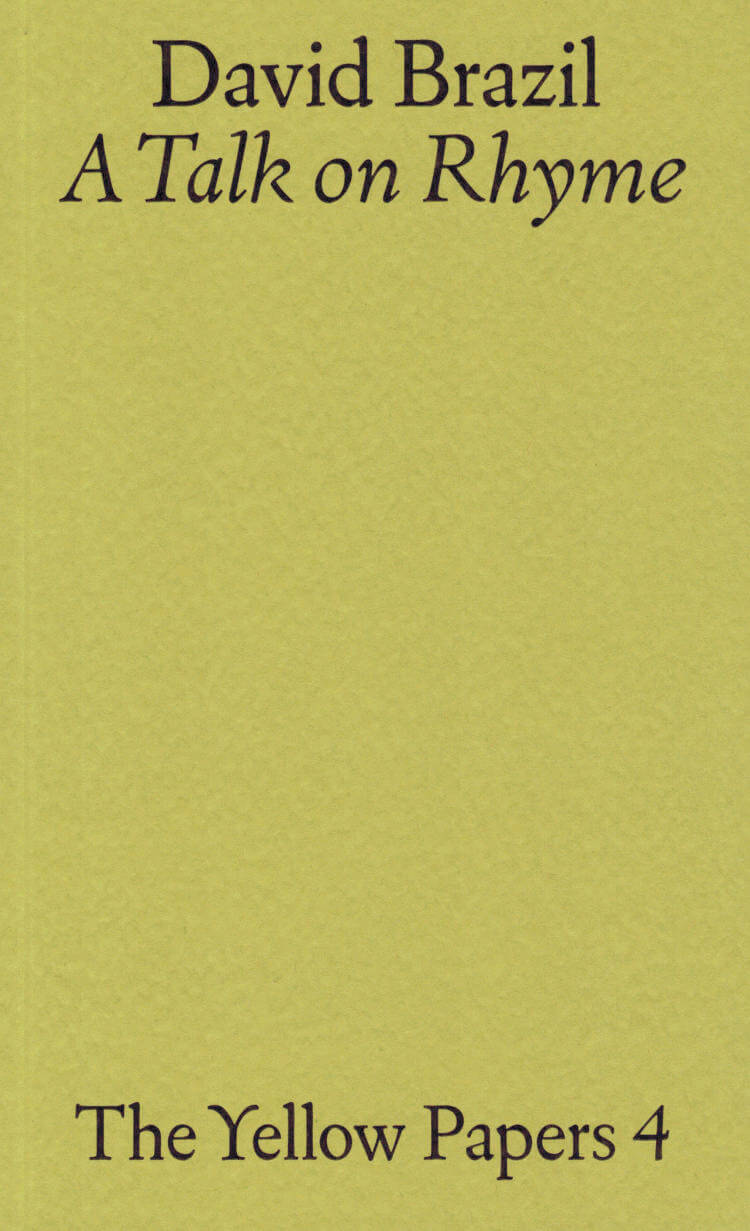
A Talk on Rhyme
In A Talk on Rhyme, a text distilled from a lecture given in 2014, poet David Brazil reflects on rhyme’s “emergence, progress, inoperativity, and prospect.” The Talk is supplemented by an essayistic bibliography on subjects ranging from classical prosody to American folk music, via writings on and by poets long dead whose names are obvious: Saint Paul, Dickinson, Herbert, Spicer, Hölderlin, Dante, O’Hara.